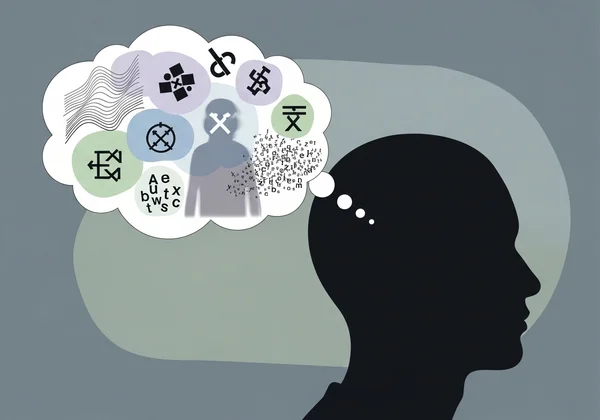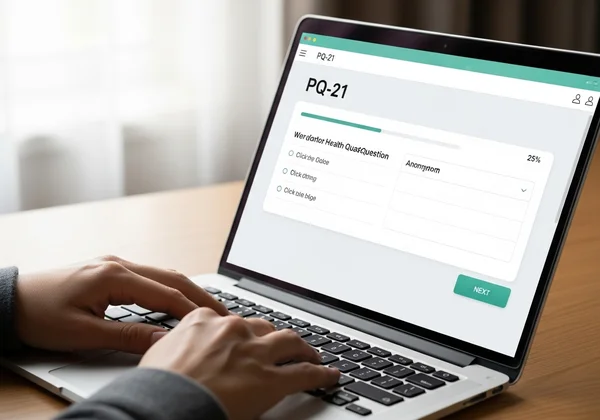Schizophrenia Test: Understanding Our PQ-21 Screening Tool
Facing the early signs of potential mental health concerns can feel incredibly daunting and confusing. Many find themselves searching for answers, wondering, "Do I have schizophrenia?" or "How can I understand what I'm experiencing?" This uncertainty can be isolating, but you are not alone. Our online assessment offers a free, confidential first step to gaining clarity: a preliminary online schizophrenia test. This article will demystify our core tool, the Prodromal Questionnaire (PQ-21), explaining its scientific basis, how it works, and its vital role in identifying early risk signals, empowering you with knowledge and a clear path forward.
Taking that first step can feel overwhelming, but remember, information is a powerful tool. Our goal is to provide a safe space where you can explore your concerns privately. This assessment is designed to be a supportive resource on your journey toward understanding your mental well-being. If you're ready to explore your experiences in a secure environment, you can start your assessment at any time.
What is the Prodromal Questionnaire (PQ-21) for Schizophrenia?
When you hear the term "questionnaire," you might think of a simple quiz. However, the Prodromal Questionnaire, specifically the 21-question version (PQ-21) used in our free screening, is a carefully designed instrument rooted in psychological research. The word "prodromal" refers to the early period of symptoms that may appear before a full-blown condition develops. The PQ-21 is therefore a tool focused on identifying these subtle, early warning signs.
It is not a "gotcha" quiz trying to label you. Instead, it serves as a structured way to reflect on your personal experiences over the past month. It gently probes into changes in perception, thought patterns, and feelings that might be causing you distress. Think of it as a guided self-reflection, providing a framework to organize thoughts that may feel chaotic or confusing. It is a preliminary step, much like a schizophrenia assessment test you might encounter in a clinical setting, but accessible from the comfort of your home.

The Science Behind Schizophrenia Screening Tools
To build trust, it's essential to understand that screening tools like the PQ-21 are not arbitrary. They are developed through extensive research into the early stages of psychotic disorders, including schizophrenia. For more information on schizophrenia, you can visit the National Institute of Mental Health. Researchers identified common subjective experiences reported by individuals in the prodromal phase. These experiences often include mild perceptual distortions, unusual thoughts, or a growing sense of suspicion that can be difficult to articulate without specific prompts.
These screening instruments are designed to be highly sensitive to these early indicators. Their purpose isn't to provide a definitive "yes" or "no" but to flag potential risks that warrant further attention from a healthcare professional. By using an established methodology, our test provides a credible and responsible starting point. It helps bridge the gap between initial concern and professional consultation, making mental healthcare more approachable.
How the PQ-21 Identifies Early Signs of Schizophrenia
How does schizophrenia start off? The onset is often gradual, marked by subtle shifts that can be easily dismissed as stress or fatigue. The PQ-21 is effective because its questions are tailored to capture these nuanced changes. The questionnaire explores experiences such as:
- Changes in Perception: Have you noticed things looking or sounding different? Do colors seem more intense or sounds more distinct?
- Unusual Thought Content: Have you had thoughts that feel intrusive or believe that others might be able to hear your thoughts?
- Suspiciousness or Paranoia: Do you feel more guarded or suspicious of others than you used to?
- Disorganized Communication: Have you found it difficult to organize your thoughts or express yourself clearly?
By asking about the presence of these experiences and the level of distress they cause, the PQ-21 creates a snapshot of your recent mental state. This information can help you and, eventually, a professional, understand if the patterns align with the known early signs of schizophrenia. It is a valuable first step in any test for schizophrenia.

How Our Free Schizophrenia Test Works: Your Online Journey
We believe that getting preliminary insights into your mental health should be straightforward and secure. Our entire process is designed with your privacy and peace of mind at its core. Taking our free schizophrenia test is a simple, three-step journey that you control completely, from start to finish. We are here to support, not to pressure.
The entire experience is anonymous and requires no personal identification. Your responses are processed to provide an immediate summary, and you can choose whether you want to receive a more detailed analysis. The power is in your hands to explore your concerns without fear of judgment or exposure.
Taking the Confidential PQ-21 Online Assessment
When you visit our homepage and decide to begin, you'll be guided to the PQ-21 questionnaire. The process is simple:
- Start Anonymously: Click "Start Test." No registration, email, or name is required.
- Answer 21 Questions: You will be presented with 21 questions about your experiences over the last month. Answer each one honestly based on how you've been feeling.
- Indicate Distress Level: For any experience you affirm, you'll be asked how much it has bothered you. This helps contextualize the results.
The interface is clean and user-friendly, ensuring you can focus on your responses without distraction. This confidential assessment is designed to be completed in just a few minutes, making it an accessible first step for anyone with concerns. You can take the free test now.

Understanding Your Preliminary Schizophrenia Assessment Results
Immediately after completing the questionnaire, you will receive a preliminary summary of your results. It is crucial to understand what this summary represents. It is not a diagnosis. Instead, it provides an initial insight based on your self-reported experiences and distress levels.
The results are intended to act as a conversation starter—either for your own reflection or to share with a trusted doctor or mental health professional. For those who want to delve deeper, we offer an optional, AI-driven report. This detailed analysis can help you better understand your personal strengths, challenges, and how your experiences might be impacting your daily life. This instant feedback from our online assessment tool empowers you with information right away.
Important Limitations: What Our PQ-21 Test Can and Cannot Do
We believe that transparency and responsibility are the cornerstones of our mission. To truly empower you, we must be crystal clear about the purpose and limitations of the PQ-21 screening tool. This online test is a valuable resource for early self-assessment, but it is only one piece of a much larger puzzle. Understanding what it can and cannot do is vital for using it correctly and safely.
Think of our tool as a smoke detector: it can alert you to the potential presence of a problem, but it cannot tell you the exact cause or extent of the fire. Only a trained professional can do that.
Why Our Test is Not a Schizophrenia Diagnosis Tool
Let us be unequivocal: our online assessment is not a schizophrenia diagnosis tool. A formal diagnosis of schizophrenia is a complex process that can only be conducted by a qualified healthcare provider, such as a psychiatrist or clinical psychologist. It involves a comprehensive evaluation that includes:
- In-depth clinical interviews to understand your personal history and symptoms.
- Observation of behavior and mental state over time.
- Ruling out other medical conditions or substance use that could cause similar symptoms.
- Psychological testing and assessment.
Our online tool screens for risk factors and potential warning signs. Many other conditions, such as severe anxiety, bipolar disorder, or trauma, can present with symptoms that overlap with the early signs of schizophrenia. Therefore, relying solely on an online screener for a diagnosis would be irresponsible and potentially harmful. We encourage you to use our online schizophrenia test as a starting point for a conversation with a professional.

When to Seek Professional Guidance for Potential Schizophrenia Symptoms
If you are experiencing thoughts, feelings, or perceptions that are causing you distress, it is always a good idea to seek professional guidance. You should consult a doctor or mental health professional regardless of your results on our screening tool. Your well-being is what matters most.
Bring a summary of your results to your appointment. This can provide a structured way to begin the conversation and help your doctor understand your concerns. Remember, reaching out for help is a sign of strength. Early intervention is one of the most important factors in achieving positive long-term outcomes for many mental health conditions, including schizophrenia.
Your First Step Towards Clarity: Empowering Yourself with Information
Facing uncertainty about your mental health can be one of life's most challenging experiences. The journey to understanding begins with a single, courageous step. Our PQ-21 screening tool is designed to be that first step—a safe, confidential, and scientifically-grounded resource to help you gain initial clarity. It transforms vague fears into structured information, empowering you to move forward with confidence.
Knowledge is power. By understanding the basis of our assessment and its role as a preliminary screening tool, you are better equipped to take control of your mental health journey. We encourage you to use this resource not as a final answer, but as the beginning of a conversation. Take the first step toward understanding your experiences today.
FAQ Section
How to test for schizophrenia?
The definitive way to test for schizophrenia is through a comprehensive evaluation by a qualified mental health professional. This process includes clinical interviews, a review of your personal and family history, and ruling out other medical conditions. Online tools like our schizophrenia assessment test serve as a preliminary screening step to help identify potential risk factors, but they cannot provide a diagnosis.
Do I Have Schizophrenia Test: What Exactly Does it Look For?
A "Do I have schizophrenia test" like our PQ-21 screener looks for the presence of specific early warning signs, known as prodromal symptoms. These include subtle changes in your thoughts, perceptions, and feelings over the past month. It also measures the level of distress these experiences are causing you, as this is a key indicator of whether further professional evaluation is needed. You can try our screening here.
What Are the Early Signs of Schizophrenia a Screening Tool Can Identify?
A screening tool can help identify a range of early signs, often categorized as positive, negative, and cognitive symptoms. These may include feeling unusually suspicious, hearing or seeing things others don't, social withdrawal, difficulty organizing thoughts, and a decline in personal hygiene or motivation. Our tool is designed to gently probe for these experiences.
Can a Blood Test for Schizophrenia or Lab Tests Confirm a Diagnosis?
No, there is currently no blood test for schizophrenia or any other single lab test that can confirm a diagnosis. While researchers are exploring potential biomarkers, a diagnosis is currently made based on clinical assessment and observation by a healthcare professional. Lab tests may be used to rule out other medical conditions (like a thyroid disorder or substance use) that could be causing psychotic symptoms.